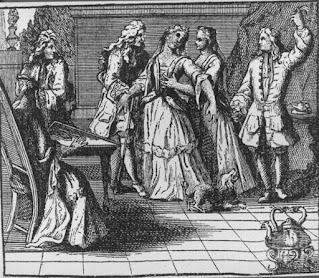Also Read
Some of Pope's contemporaries found in The Rape Of The Lock immoral and distasteful, lacking in the true qualities of wit and judgement. However in this trivial satire also Pope has incorporated an element of morality and that morality constitutes in Clarissa's renowned speech delivered in the last canto.
Clarissa is the women whose speech conveys to us the moral of the poem. She looks Belinda's feminine divinity and sparkling manner. She deals out moral percepts, however sound with the righteous indignation of an English governess. Her famous speech which parodies that of Sarpedon to Glaucus in the Iliad illustrates that Clarissa is moral and heroic. Her speech runs thus -
The fleeting nature of physical beauty is well expressed by her -
Clarissa's speech then maybe taken as conveying the moral of the poem. The glorious of social position and privilege are achieved in vain unless there is no good sense. The best course for a women is there for to make good use of there power, maintaining good humour. Old age and smallpox will wreck a lady's beauty, inspite of all the gaiety of dancing and inspite of all the time spent on dressing table. Human beauty is vain and the real beauty lies in once inner soul or merit. This is the moral element of The Rape Of The Lock as has been discussed by Pope and conveyed through Clarissa's speech.
 |
| The Rape Of The Lock |
Clarissa is the women whose speech conveys to us the moral of the poem. She looks Belinda's feminine divinity and sparkling manner. She deals out moral percepts, however sound with the righteous indignation of an English governess. Her famous speech which parodies that of Sarpedon to Glaucus in the Iliad illustrates that Clarissa is moral and heroic. Her speech runs thus -
"How vain are all glories, all our pains,
Unless good sense preserve what beauty gains"
The fleeting nature of physical beauty is well expressed by her -
"But since, alas! frail beauty must decay,
Curled or uncurled since locks turn to grey........................beauty is in vain, their pretty eyes may roll charms strike the mind, but merit wins the soul."